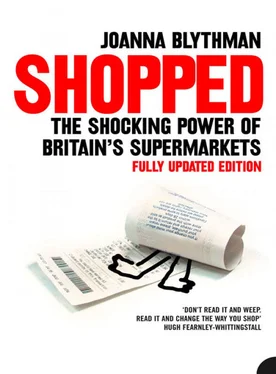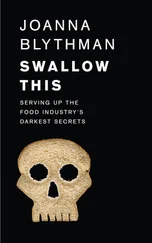In the 1960s, before the large UK-wide supermarket chains managed to persuade Dundee’s impoverished city council, desperate for cash, to let them have their way, this area was a thriving centre for food shopping. There were ten bakers; now there are two left. There were eight or nine butchers; now there is one. Of the five fishmongers, one has survived. Where there were half a dozen grocers, one remains. Food shoppers – as opposed to food grazers – will find little to sustain them in Dundee city centre these days.
When I visited Dundee in 2003, the city had four Tescos, two Safeways, two Asdas, one Sainsbury’s, one Marks & Spencer and a clutch of discount and low-price outlets. Asda had submitted a planning application to build a third store on a greenfield site. It had commissioned a traffic-impact study to support its application and was reported to be ‘ready and waiting’ to state its case to councillors when it came before the planning committee. Residents, meanwhile, had formed an action group to oppose the application. Not to be left out of Dundee’s supermarket mêlée, Morrisons was also in talks with the city council over its application to build a further 90,000-square-foot superstore in the city, close in scale to a Tesco Extra or an Asda superstore. Since both the Asda and Morrisons proposed sites were on council land, Dundee City Council stood to receive a substantial windfall from the sales. ‘Some estimates have put the amount the local authority stands to make at anywhere between £ 15 and £ 20 million,’ reported the Evening Telegraph . Dundee clearly did not need any more supermarkets. Yet with this sort of money to play for, you could see why councillors might be sorely tempted to say yes to a couple more.
As it stands, any Dundonian who wants to shop in independent outlets must travel to Broughty Ferry, now effectively a prosperous suburb of the city and home to a thriving rump of small shops that have so far been sheltered from the city’s supermarket revolution. Here independent shopkeepers are endlessly resourceful in thinking up new ways of seeing off the supermarket threat. ‘We [independent traders] are relying on the overall viability of the area by creating a food shopping cluster,’ baker Martin Goodfellow told me. A few doors along, David Craig has reinvented his butcher’s shop, Robertson’s, as a mini Harrods food hall on the Tay, and it is renowned for its exceptional range and personal service. Both men are optimistic that they can hold the line against the supermarkets, but with new superstores opening and existing ones being extended, they remain far from complacent.
Wherever you go now in the UK, you will find cities and towns whose vitality has been drained by supermarkets. Terence Blacker wrote in the Independent :
I live in East Anglia where the progress of convenience shopping has had a visible effect on the quality of life. My nearest town, Diss, has two supermarkets, squatting each side of the thoroughfare that passes near the town centre. One is adequate, the other cheap but hilariously awful. As a result of their presence, the main shopping street of a market town of 6,000 people consists almost entirely of charity shops, estate agents and, mysteriously, a number of greetings card emporia. As they go out of business, small retailers complain that the life of the town is draining away, but the planning authorities remain unimpressed. It has just been announced that Tesco has been given permission to build another vast superstore beside the main road.
Writing in The Grocer , James Millar drew attention to the irony of the situation where he lived in Gloucestershire. ‘A recent survey has just pronounced my local town, Tetbury, the third most desirable place to live in the UK. Tetbury, undeniably, is a nice place to live. Yet the only places you can buy apples, cauliflowers or a bag of potatoes are the local Somerfield and the almighty new Tesco. The fruit and vegetable shop has gone – shut down. We have two local butcher’s shops but I wouldn’t count their chickens.’
A reader wrote to tell me of the similar effect of a new Sainsbury’s on the market town of Bourne in Lincolnshire. Both of the independent greengrocers had closed. One of them had become a doll’s house and miniatures shop. The other had turned into a bargain outlet that sold anything, providing it was extremely cheap.
It is not only small shops that close as supermarket leviathans move in. Small or medium-sized supermarkets – the kind that can coexist with independent retailers rather than close them down – are vulnerable. In November 2003, for example, the Midlands Co-op had to close a store in Thurmaston which had been open since the 1970s after it lost the bulk of its business to a new 45,000-square-foot Asda which had opened directly opposite.
It is a familiar story, one that can be recounted time and time again by people living in every part of the UK. When the big supermarkets move in, towns and cities are pushed to what the New Economics Foundation calls ‘the tipping point’. When the number of local retail outlets falls below a critical mass, the quantity of money circulating in the local economy suddenly plummets as people find there is no point in trying to do a full shop where the range of local outlets is impoverished. ‘This means a sudden, dramatic loss of services – leading to food and finance deserts,’ says the Foundation. In the case of big centres of population, this desertification expresses itself in a carbon-copy townscape dominated by omnipresent chains and fast-food outlets. In small places, it manifests itself in one of two forms: either pretty, but useless, main streets with a dearth of everyday services, or wholesale depression and deadness.
Supermarkets already gobble up a greedy 80 per cent of the nation’s grocery spend. Now they want the remaining 20 per cent. The long-term vision of the largest amongst them is that by 2020 or thereabouts, only two or three major players will possess more or less total control of the grocery market. This would make the supermarket sweep to power complete. These players would then have buyer power that allowed them to dictate terms to farmers, food producers and suppliers all over the world. Even the biggest brands, international household names, would be at their beck and call.
If supermarkets get their way, everything we buy, whether it is from a superstore, a smaller city store, a corner shop or a petrol-station forecourt, will be sold by a supermarket chain. There will be small shops, but not as we know them now. They will be run not by independents but by the supermarket chains. To realise this goal, supermarkets have embarked on a new mission. They’re after what’s known as ‘the small basket’, those more frequent shopping trips we make for just a few items. This market is what one industry commentator has called ‘the new competitive challenge’.
Think of it this way. In the process of sewing up the bulk of our shopping spend, supermarkets have managed to alter our perception of food shopping totally. Where people once shopped for food fairly frequently – if not daily, probably every other day – supermarkets have institutionalised the one-stop shopping trip, a weekly expedition to stock up for the next seven days under one roof. For busy working people this system has its attractions. In theory, the one-stop shop allows us to clear the decks, to get ourselves organised in one fell swoop, saving us from having to think about grocery shopping for the rest of a pressurised week. There are, of course, problems with the concept. Fresh items such as fruit and vegetables don’t all naturally last for a week. This doesn’t stop supermarkets selling them to us: they simply instruct suppliers to harvest them ‘green and backward’ so that they don’t rot and look OK on the shelves, even if they taste of zilch when we get them back home. And do you know any fishmongers who reckon that fish can be stored in domestic fridges for several days at a time, as supermarkets would have us believe, and still taste fresh when it’s cooked?
Читать дальше












